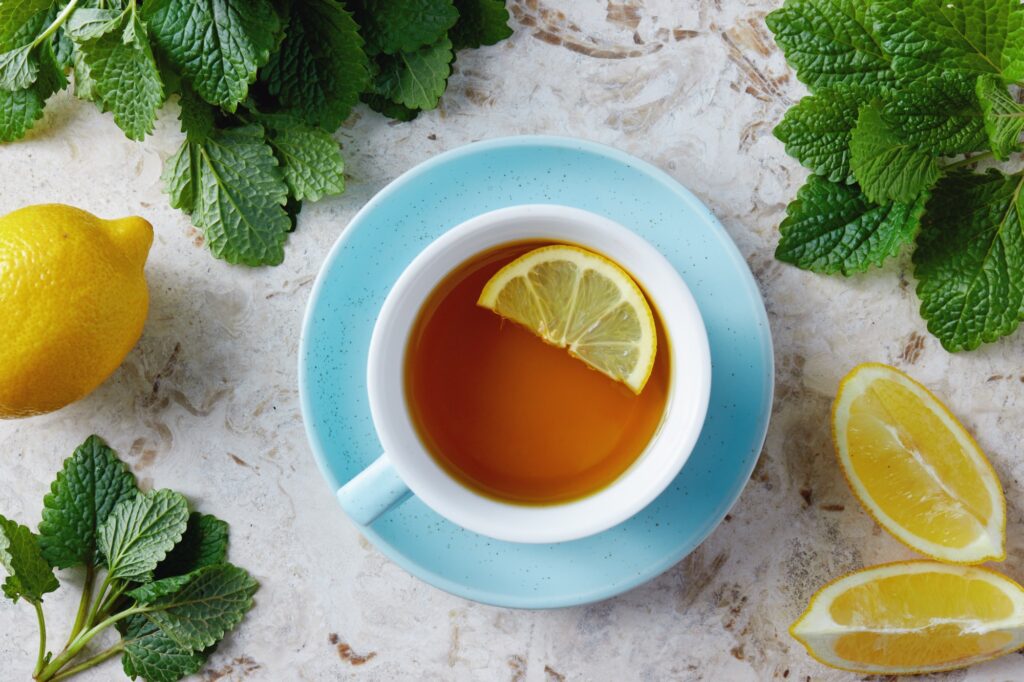
Anxiety is a widespread mental health condition that affects millions of people worldwide. It is characterized by persistent feelings of worry, fear, and unease, which can have a significant impact on an individual’s daily life and overall well-being. Anxiety can manifest in various forms, such as generalized anxiety disorder, social anxiety, and panic attacks, and it can lead to physical symptoms like muscle tension, headaches, and insomnia.
The impact of anxiety on mental health can be profound. It can interfere with an individual’s ability to focus, make decisions, and engage in social interactions. Prolonged anxiety can also contribute to the development of other mental health issues, such as depression, and can negatively affect one’s quality of life. Recognizing the importance of addressing anxiety and finding effective ways to manage it is crucial for maintaining overall mental health and well-being.
Lemon Balm Tea and Its Calming Properties
One natural remedy that has gained attention for its potential to alleviate anxiety is lemon balm tea. Lemon balm (Melissa officinalis) is a fragrant herb that has been used for centuries in traditional medicine for its calming and soothing properties. The leaves of the lemon balm plant contain compounds that may have a positive effect on the nervous system, making it a popular choice for those seeking a natural way to manage anxiety.
Lemon balm tea is made by steeping the dried leaves of the lemon balm plant in hot water. The resulting beverage has a delicate, citrusy flavor and a calming aroma that can help to soothe the mind and body. Drinking lemon balm tea has been associated with various benefits, including reduced anxiety, improved sleep, and enhanced cognitive function.
How Lemon Balm Tea Helps in Reducing Anxiety
The ability of lemon balm tea to alleviate anxiety can be attributed to its unique chemical composition. The herb contains various compounds, such as rosmarinic acid, citronellal, and linalool, which have been shown to have a positive impact on the nervous system.
One of the primary ways lemon balm tea can help reduce anxiety is by modulating the levels of neurotransmitters in the brain. Neurotransmitters are chemical messengers that play a crucial role in regulating mood, stress, and anxiety. Lemon balm has been found to increase the availability of gamma-aminobutyric acid (GABA), a neurotransmitter that has a calming effect on the brain, and to inhibit the breakdown of acetylcholine, another neurotransmitter involved in cognitive function and mood regulation.
Additionally, lemon balm tea may help to reduce the physical symptoms of anxiety, such as muscle tension and elevated heart rate, by promoting relaxation and lowering cortisol levels, the primary stress hormone. By addressing both the psychological and physiological aspects of anxiety, lemon balm tea can be an effective tool for managing this common mental health condition.
The Science Behind Lemon Balm Tea’s Anxiety-Relieving Effects
The scientific evidence supporting the use of lemon balm tea for anxiety relief is growing. Several studies have investigated the potential benefits of lemon balm and its active compounds in the context of anxiety and stress management.
One study published in the European Journal of Nutrition found that consuming lemon balm extract for 15 days significantly reduced anxiety and improved calmness in a group of healthy adults. Another study, conducted on individuals with mild to moderate anxiety, demonstrated that lemon balm supplementation led to a reduction in anxiety symptoms and improved cognitive performance.
Researchers have also explored the mechanisms by which lemon balm exerts its calming effects. As mentioned earlier, the herb’s ability to modulate neurotransmitter levels, particularly GABA and acetylcholine, is believed to be a key factor in its anxiety-reducing properties. Additionally, lemon balm has been shown to have antioxidant and anti-inflammatory properties, which may also contribute to its beneficial effects on mental health.
It is important to note that while the scientific evidence is promising, more research is still needed to fully understand the extent and mechanisms of lemon balm’s anxiety-relieving effects. However, the existing studies suggest that incorporating lemon balm tea into one’s daily routine may be a natural and effective way to manage anxiety and promote overall mental well-being.
Preparing Lemon Balm Tea for Anxiety Relief
Brewing a soothing cup of lemon balm tea is a simple and accessible way to harness its calming properties. Here is a step-by-step guide to preparing the perfect lemon balm tea for anxiety relief:
- Gather the Ingredients:
- Fresh or dried lemon balm leaves
- Filtered or purified water
- Honey or lemon (optional)
- Heat the Water:
- Bring the water to a gentle boil in a kettle or saucepan.
- Steep the Lemon Balm:
- Place the lemon balm leaves (approximately 1-2 teaspoons per cup of water) in a tea infuser or directly in the hot water.
- Allow the lemon balm to steep for 5-7 minutes, or until the tea has reached your desired strength.
- Strain and Serve:
- Remove the tea infuser or strain the lemon balm leaves from the hot water.
- Pour the lemon balm tea into your favorite mug or cup.
- Customize the Flavor (Optional):
- Add a teaspoon of honey or a squeeze of lemon to enhance the flavor and provide additional health benefits.
It’s important to note that the optimal steeping time and amount of lemon balm leaves may vary depending on personal preference and the specific tea blend. Experiment with different ratios and steeping times to find the perfect balance of flavor and anxiety-relieving effects.
Incorporating Lemon Balm Tea into Your Daily Routine
To maximize the benefits of lemon balm tea for anxiety relief, it’s recommended to incorporate it into your daily routine. Here are some tips for making lemon balm tea a regular part of your self-care regimen:
- Establish a Calming Ritual: Set aside a specific time each day, such as in the morning or evening, to enjoy a soothing cup of lemon balm tea. This ritual can help to create a sense of mindfulness and relaxation.
- Pair It with Relaxation Practices: Combine your lemon balm tea drinking with other calming activities, such as deep breathing exercises, meditation, or gentle stretching. This can enhance the overall relaxation and stress-reducing effects.
- Carry Lemon Balm Tea with You: Keep a portable tea infuser or tea bags with you throughout the day, so you can easily brew a cup of lemon balm tea whenever you feel the need for a calming break.
- Experiment with Blends: Try mixing lemon balm with other calming herbs, such as chamomile or lavender, to create a personalized tea blend that caters to your specific anxiety management needs.
- Maintain Consistency: Consistency is key when it comes to the long-term benefits of lemon balm tea. Make it a habit to drink a cup of lemon balm tea regularly, even on days when you don’t feel particularly anxious.
By incorporating lemon balm tea into your daily routine, you can harness its soothing properties and cultivate a sense of calm and well-being that can help you better manage anxiety and promote overall mental health.
Other Natural Remedies for Anxiety Relief
While lemon balm tea is a powerful natural remedy for anxiety, it’s not the only option available. Here are some other natural remedies that may be beneficial for managing anxiety:
- Herbal Supplements: Herbs like chamomile, lavender, and valerian root have also been studied for their potential anxiety-reducing effects. These supplements can be taken in the form of capsules, tinctures, or teas.
- Mindfulness and Meditation: Practices like mindfulness, meditation, and deep breathing can help to calm the mind, reduce stress, and alleviate anxiety symptoms.
- Exercise and Physical Activity: Regular physical activity, such as yoga, walking, or swimming, can release endorphins and promote relaxation, which can be helpful for managing anxiety.
- Aromatherapy: Essential oils, such as lavender, bergamot, and ylang-ylang, can be used in diffusers or applied topically to promote a sense of calm and relaxation.
- Dietary Changes: Adjusting your diet to include anxiety-reducing foods, such as those rich in omega-3 fatty acids, magnesium, and B vitamins, may also provide some relief from anxiety symptoms.
It’s important to note that while these natural remedies can be beneficial, it’s always a good idea to consult with a healthcare professional, especially for those with severe or persistent anxiety, to ensure a comprehensive and effective treatment plan.
Lemon Balm Tea vs. Other Herbal Teas for Anxiety
When it comes to managing anxiety, lemon balm tea is not the only herbal tea option available. Here’s a comparison of lemon balm tea with some other popular herbal teas for anxiety relief:
| Tea Type | Key Compounds | Potential Benefits for Anxiety |
|---|---|---|
| Lemon Balm Tea | Rosmarinic acid, citronellal, linalool | Modulates neurotransmitters, promotes relaxation, reduces stress and anxiety symptoms |
| Chamomile Tea | Apigenin, luteolin, quercetin | Possesses anti-anxiety and sedative properties, may help with sleep and relaxation |
| Lavender Tea | Linalool, linalyl acetate | Has a calming and soothing effect, may reduce anxiety and improve sleep quality |
| Valerian Tea | Valerenic acid, isovaleric acid | Acts as a mild sedative, may help with reducing anxiety and improving sleep |
| Green Tea | L-theanine, caffeine | L-theanine promotes relaxation, while the low caffeine content can help manage anxiety without overstimulation |
While each of these herbal teas has its own unique properties and potential benefits for anxiety management, lemon balm tea stands out for its ability to directly target the underlying neurochemical imbalances associated with anxiety. Additionally, lemon balm tea is generally well-tolerated and has a pleasant, citrusy flavor that can be enjoyed on its own or blended with other calming herbs.
Lemon Balm Tea for Long-Term Anxiety Management
In addition to providing immediate relief from anxiety symptoms, incorporating lemon balm tea into your daily routine can also offer long-term benefits for managing anxiety. Here’s how lemon balm tea can be a valuable tool for long-term anxiety management:
- Consistent Stress Reduction: The regular consumption of lemon balm tea can help to lower cortisol levels, the primary stress hormone, over time. This can lead to a reduction in chronic stress and a more balanced stress response.
- Improved Sleep Quality: Lemon balm’s calming properties can also promote better sleep, which is crucial for managing anxiety. Improved sleep quality can have a positive ripple effect on overall mental health and well-being.
- Enhanced Cognitive Function: The compounds in lemon balm, such as rosmarinic acid and linalool, have been shown to improve cognitive performance, including memory, attention, and decision-making. This can be particularly beneficial for individuals who struggle with anxiety-related cognitive impairments.
- Reduced Reliance on Medication: For some individuals, lemon balm tea may provide a natural alternative to pharmaceutical anxiety medications, reducing the need for long-term drug therapy and its potential side effects.
- Holistic Approach to Anxiety Management: Incorporating lemon balm tea into a comprehensive anxiety management plan, alongside other lifestyle modifications and therapeutic interventions, can create a holistic and sustainable approach to addressing this mental health condition.
By consistently incorporating lemon balm tea into your daily routine, you can harness its long-term benefits and contribute to a more balanced and resilient approach to managing anxiety over time.
Harnessing the Power of Lemon Balm Tea for a Calm Mind
In the face of the growing prevalence of anxiety disorders, finding natural and effective ways to manage this mental health condition is increasingly important. Lemon balm tea, with its unique blend of calming compounds and scientific evidence backing its anxiety-relieving properties, offers a promising solution for those seeking a natural way to soothe the mind and promote overall well-being.
By understanding the mechanisms behind lemon balm tea’s ability to modulate neurotransmitters, reduce stress, and improve cognitive function, individuals can make informed decisions about incorporating this herbal tea into their daily routines. Whether enjoyed as a calming ritual, paired with relaxation practices, or blended with other soothing herbs, lemon balm tea can be a powerful tool in the arsenal against anxiety.






